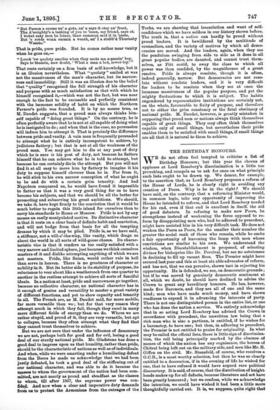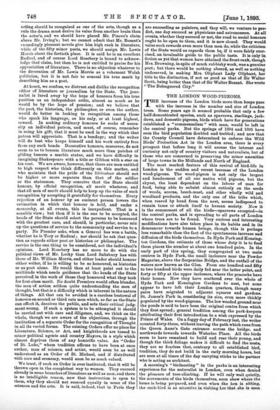THE BIRTHDAY HONOURS.
WE do not often feel tempted to criticise a list of Birthday Honours ; but this year the chorus of applause at Lord Rosebery's discrimination is a little too provoking, and compels us to ask for once on what principle such lists ought to be drawn up. We demur, for example, to the assertion that, as Lord Rosebery proposes a reform of the House of Lords, he is clearly right in avoiding any creation of Peers. Why is he in the right ? We should have said, on the contrary, that a reforming Minister would, in common logic, take any opportunity of improving the House he intended to reform, and that Lord Rosebery needed for his end, even if that end is excellent in itself, the aid of good debaters. In refusing to make new Peers, he strengthens instead of weakening the force opposed to re- form by disappointing men who, had be adhered to precedent, might have assisted him in his very difficult task. He does not weaken the Peers as Peers, for the smaller their number the greater the social rank of those who remain, while he omits a fair opportunity of leavening the lump with men whose convictions are similar to his own. We understand the wisdom, when Disestablishment is proposed, of selecting divines for bishoprics like Dr. Percival, but see no astuteness in declining to fill up vacant Sees. The Premier might have secured last year and this at least six able advocates of reform, and has not, that we can perceive, shown tact in rejecting his opportunity. He is defended, we see, on democratic grounds ; but if he was moved by genuinely democratic sentiment at all, which we doubt, he should have declined to advise the Crown to grant any hereditary honours. He has, however, made five Baronets, and they are all of one and the same kind ; men who have made much money, and have shown readiness to expend it in advancing the interests of party. There is not one distinguished person in the entire list, or one who has done the nation a service. We entirely acknowledge that in so acting Lord Rosebery has advised the Crown in accordance with precedent, the unwritten law being that a rich man who is also a partisan, is entitled, if he wishes for a baronetcy, to have one; but then, in adhering to precedent, the Premier is not entitled to praise for originality. In what may be called the official lists, there is little sign of discrimina- tion, the roll being principally marked by the absence of names of which the nation has any cognisance, the heroes of Chitral being left out on the military side, and men like Mr. R. Giffen on the civil. Mr. Stanefeld, of course, who receives a G.C.B., is a most worthy selection, but then he was so clearly entitled to a decoration, if in the evening of life he wished for one, that to have refused it would have argued rare political discourtesy. It is said, of course, that the distribution of knight. hoods makes up for all defects, because literature and art have been greatly honoured ; but we confess, while we acknowledge the intention, we could have wished it had been a little more thoughtfully carried out. It is, we suppose, quite right that acting should be recognised as one of the arts, though as a rule the drama must derive its value from another brain than the actor's, and we should have placed Mr. Pinero's claim above Mr. Irving's ; but we cannot admit that Mr. Besant's. exceedingly pleasant novels give him high rank in literature, while of the fifty minor poets, we should assign Mr. Lewis Morris about the fortieth place. It is said he is an excellent Radical, and of course Lord Rosebery is bound to acknow- ledge that claim, but then he is not entitled to praise for his appreciation of literature. There is no objection whatever to the decoration of Mr. Lewis Morris as a vehement Welsh politician, but it is not fair to conceal his true merit by describing him as a poet.
At heart, we confess, we distrust and dislike the recognition either of literature or journalism by the State. The jour- nalist is lured away by the hope of honours from his true position as an independent critic, almost as much as he would be by the hope of pension; and we believe that the poet, the historian, the philosopher, or even the author, would do better in looking to recognition among those who speak his language, as his only, or at least highest, reward. In seeking ordinary honours he seeks of neces- sity an individual patron, and must, of course, remember in using his gift, that it must be used in the way which that patron will appreciate. That is a bondage ; and the writer will do best who keeps himself and his work entirely free from any such bonds. Decorative honours, moreover, do not seem to us to beseem literature much more than patches of gilding beseem a marble statue, and we have difficulty in imagining Shakespeare with a title or Gibbon with a star on his coat. We are aware, however, that there are men entitled to high respect who think differently on this matter, and who maintain that the pride of the litterateur should not be higher or more separate than that of the soldier or the statesman. They conceive that the State should honour, by official recognition, all merit whatever, and that all men of merit should help to keep up the value of such recognition by accepting it gratefully for themselves. Every rejection of an honour by an eminent person lowers the estimation in which that honour is held, and under a monarchy, at all events, this is inexpedient. That is a sensible view ; but then if it is the one to be accepted, the heads of the State should select the persons to be honoured with the greatest care, and should, in particular, never mix up the questions of service to the community and service to a party. No Premier asks, when a General has won a battle, whether he is Tory or Radical ; nor should he ask that ques- tion as regards either poet or historian or philosopher. The service is the one thing to be considered, not the individual's opinions. Lord Rosebery has no more to do with the political views of Mr. Lecky than Lord Salisbury has with those of Mr. William Morris, and either leader should honour either writer, if he is willing to be so honoured, as historian or as poet alone. He would then at least point out to the multitude which needs guidance that the heads of the State perceived in the work of those they honoured what they took for first-class merit. No doubt Premiers would often blunder, the men of action seldom quite understanding the men of thought, but that is a difficulty which is inherent in the nature of things. All that can be avoided is a careless bestowal of honours on second or third rate men which, so far as the State can effect it, deceives the public, and sets their critical judg- ment wrong. If such a system is to be attempted it should be carried out with care and diligence, and, we think on the whole, though we are aware of the objections, through the institution of a separate Order for the recognition of Thought in all its varied forms. The existing Orders offer no place for Literature, Science, or Art, and knighthoods are tossed to minor political agents and country Mayors, in a style which almost deprives them of any honorific value. An "Order of St. Luke," whom tradition affirms to have been at once author, man of science, and artist, would soon be as well understood as an Order of St. Michael, and if distributed with care and economy, would soon be as much valued.
We trust, if such an Order is ever instituted, that it will be thrown open in the completest way to women. They succeed already in some branches of literature as well as men, and there is no intelligible reason, now that instruction is open to them, why they should not succeed equally in some of the sciences and the arts. It is said, indeed, that in Paris they
are succeeding as painters, and they will, we venture to pre- dict, one day succeed as physicians and astronomers. At all events, whether they succeed or not, the road to social honours ought to be open to them, and it is now closed. They would value such rewards even more than men do, while the criticism of the State would as regards them be, if it were fairly exer- cised, an invaluable guide to the public taste. It is only in fiction as yet that women have attained the front rank, though Mrs. Browning, in spite of much rubbishy work, was a genuine poet; but there would be nothing absurd, as well as nothing undeserved, in making Mrs. Oliphant Lady Oliphant, her title to the distinction, if not as good as that of Sir Walter Scott, being better than that of Sir Walter Besant. She wrote ‘. The Beleaguered City."







































 Previous page
Previous page